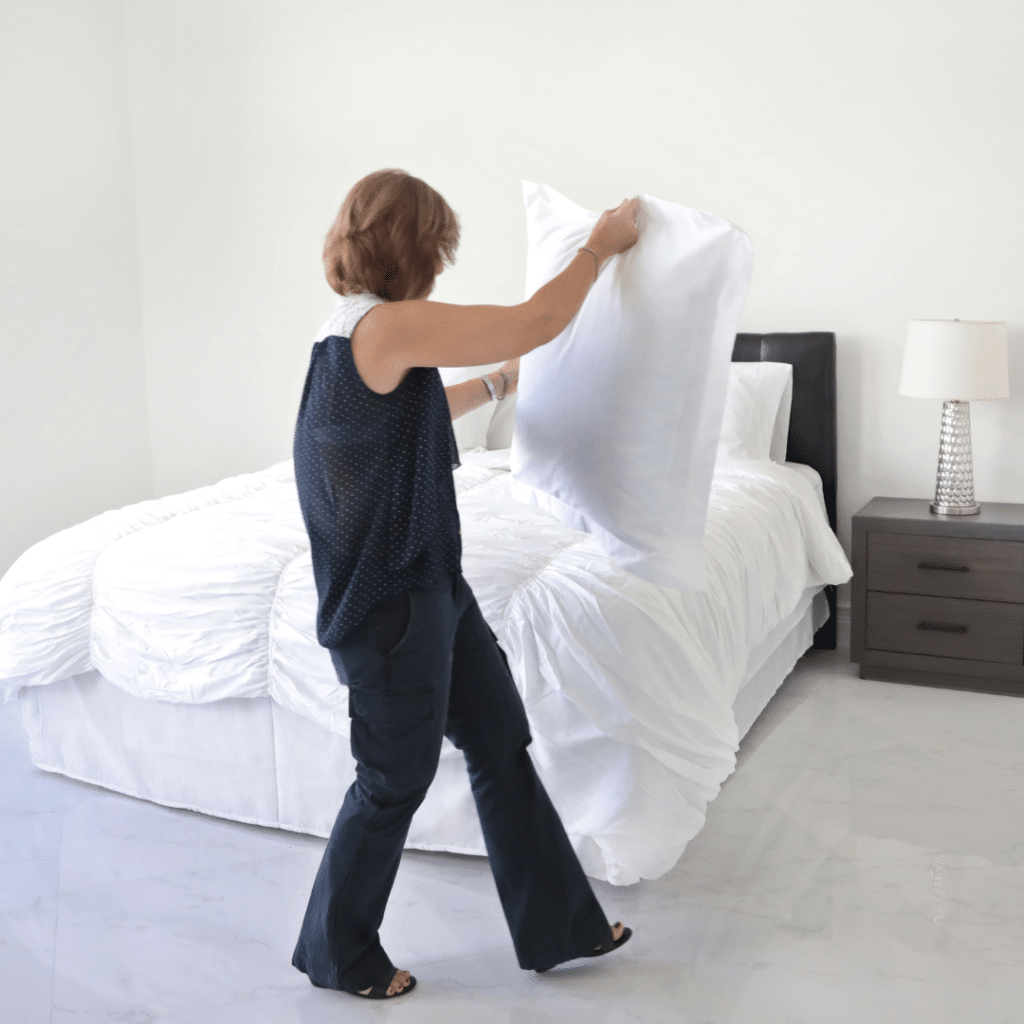
Welcome to the Home Stager’s Handbook: Your Go-To Resource for All Things Home Staging!
Whether you’re a homeowner looking to sell or a real estate enthusiast, we’ve got the answers to your most pressing questions.
Let’s dive right in!
professional home staging FAQ's
According to a recent study published by NAR (National Association of Realtors), buyers agents overwhelmingly agreed that 82% of buyers find it easier to visualize living in a staged home.
Home staging is the art of preparing a home for sale by showcasing its best features. It helps potential buyers visualize themselves living in the space, leading to quicker sales and often higher offers.
According to Zillow, the average total price cut is 2.9% of the listing price.
With an average investment of 1% of the sale price into staging, about 75% of sellers saw an ROI of 5% to 15% over asking price, according to data from the Real Estate Staging Association (RESA).
Furthermore, staged homes are estimated to sell up to 75% faster than unstaged properties.
Staging your property will elevate it’s marketability, limit your time on the market and as such, reduce the need to cut your asking price!
As it relates to homes occupied by their owners during the listing period, some Home staging companies provide pre-listing guidance.
We, at Cozy Corners Home Staging, provide both virtual (45 minute virtual tour) and in-person (2 hours and more hands-on) consultation services, guiding homeowners, investors and realtors on how to best present the home for sale.
During this appointment , we may address
- Furniture Arrangement
- Decor
- Use of space
- Cosmetic updates required
- Paint and color scheme
- Proper lighting
CC Home Staging and Design will review your property room by room, document any important items to note, and summarize the appointment by providing a comprehensive property priority report and reference guide to remember before and during the listing of your home.
This will leave you equipped to prepare the house and get it ready for listing on your own, should you choose to.
Just under 20% of all home buyers can visualize use of space necessary in order to create an emotional connection to the home.
This means that for over 80% of potential home buyers, their first impression of how your house is prepared can make or break the deal.
To help them visualize living in the home, it is imperative that living spaces are clearly defined and, of course, warm and inviting.
Attention to detail in this area is key during this process as it will will give any prospective buyer the confidence in the listing to pursue next steps.
For this reason, staged homes sell more quickly and at higher price points than un-staged homes.
Yes! We invite you to browse the Consumer’s Guide to Real Estate Staging and many other publications available from the Real Estate Staging Association.
Absolutely! Simple changes like decluttering, rearranging furniture, and adding fresh paint can make a significant impact. Our blog provides budget-friendly tips for effective home staging.
Focus on curb appeal, depersonalizing spaces, maximizing natural light, and highlighting the home’s unique selling points. Each room should tell a story that resonates with potential buyers.
While staging all rooms can enhance the overall appeal of a home, it’s not always necessary. Prioritizing key rooms is a common approach that allows for effective staging without exceeding the budget. The following rooms are often prioritized for staging:
Living Room: This is a focal point for potential buyers. Staging can help them visualize how the space can be utilized for relaxation and socializing.
Kitchen: A well-staged kitchen can significantly impact a buyer’s impression. Highlighting its functionality and aesthetics is key.
Master Bedroom: Buyers are drawn to a comfortable and inviting master bedroom. Staging can emphasize the room’s potential for relaxation and rest.
Dining Room: Staging the dining area helps buyers envision entertaining guests and enjoying meals in the space.
Master Bathroom: A spa-like master bathroom can create a luxurious feel, appealing to potential buyers seeking a retreat-like experience.
Outdoor Spaces: If applicable, staging outdoor areas like patios or decks can showcase additional living space and enhance the overall appeal of the property.
While these rooms are commonly prioritized, the decision to stage all rooms depends on the property’s unique characteristics and the target market. Consulting with a professional stager can help determine the most effective staging strategy based on the specific features and layout of your home.
Yes! While personal style is important, staging is about creating a neutral, inviting atmosphere that appeals to a broad range of buyers. It’s not about your taste; it’s about showcasing the home’s potential.
Stick to neutral tones like whites, grays, and soft beiges. These colors create a clean, versatile canvas that allows buyers to envision their belongings in the space.
DIY staging is possible with the right guidance, but a professional stager brings expertise and a fresh perspective.
Consider your budget and the time you have available when making this decision.
See our blog on how to stage on a budget and considering hiring a professional stager to provide a virtual or in-home consultation to help prioritize so your time and money is well spent!
The cost of staging a home varies widely and depends on factors such as the size of the property, the extent of staging needed, and the location. On average, homeowners can expect to pay anywhere from a few hundred to several thousand dollars for professional home staging services. Some stagers charge a flat fee, while others use a pricing model based on the value of the property.
Factors influencing the cost include:
Property Size: Larger homes generally require more furniture and accessories, impacting the overall cost of staging.
Staging Level: The extent of staging, whether it’s a whole-house staging or specific rooms, affects the cost. Full-home staging tends to be more expensive than staging just key areas.
Rental Furniture Quality: The quality and style of the furniture and decor chosen for staging influence costs. Higher-end furnishings may result in a higher overall staging cost.
Geographic Location: Staging costs can vary based on the region or city due to differences in the real estate market and the availability of staging services.
Duration of Staging: If the home takes longer to sell, there may be ongoing staging fees. Some stagers charge monthly rental fees for the furniture and accessories used in the staging.
A professional Stager will create a stage plan that will fit into your budget. A transparent conversation about budget and expectations will aid in prioritizing that which is needed to showcase the home at its best.
Virtual staging involves digitally altering images to add or modify furniture, decor, and other elements. We believe that this can create a misleading representation of the property, as the virtual enhancements may not accurately reflect the current state of the home.
Virtual staging sets unrealistic expectations for potential buyers who view the digitally enhanced photos online and leads to disappointment and a negative impact on the overall home-buying experience.
Home staging and interior design serve distinct purposes. Home staging focuses on presenting a property for sale, emphasizing its best features to attract potential buyers. It aims to create a neutral, universally appealing environment, often involving depersonalization.
On the other hand, interior design is about personalizing a space to meet the specific tastes and preferences of the occupants. It considers long-term functionality, lifestyle, and aesthetic preferences, incorporating unique design elements and personal touches.
A certified stager will understand these real estate staging principles and incorporate design as needed to help best showcase your home for sale.
Begin the staging process as soon as possible, well before listing photos are taken. If hiring a professional, contact them at least two weeks prior to going live to give them (and you!) enough time to address any issues which might be viewed as problematic for buyers.
This allows for thorough preparation and ensures your home leaves a lasting first impression online and during showings.
Be certain to ask the right questions.
To summarize, these questions include:
Are you registered, certified and insured?
There are many new home stagers that pop up in the industry, especially when the Real Estate Market is hot. Many haven’t undergone the proper training and certification programs that is available for serious home stagers.
Do you provide a contract?
A staging contract is there to protect both you and the staging company. Transparency and clear terms are important as you enter a business relationship.
Can you share a portfolio?
Does it resonate with you? The aesthetics are important and can provide clear representation of what kind of styling and inventory you can expect for your project.
What are your statistics?
A legitimate home staging company will have no trouble sharing some basic statistics with you. In fact, a great staging company will be eager to share this data with you
Did we answer all of your questions? Do you have any additional questions for you which we did not address? Please let us know by leaving a comment! We would love to hear from you!
Book your consultation today

Hello! My Name is Nastassja and I'm the Owner and Lead Property Stylist for Cozy Corners Home Staging and Design, an Arizona Premier Home Staging Company serving the greater Phoenix area (with virtual services to serve well beyond). We take staging seriously. We're not here to play house. Our goal is to increase the perceived value of your home and get you to achieve your real estate goals as quickly as possible.
Nastassja







Great content! Keep up the good work!